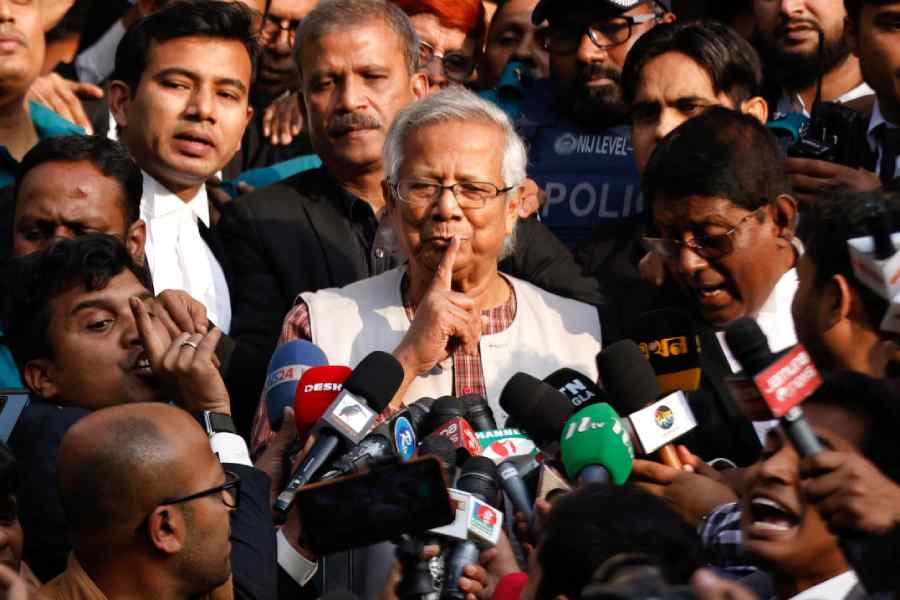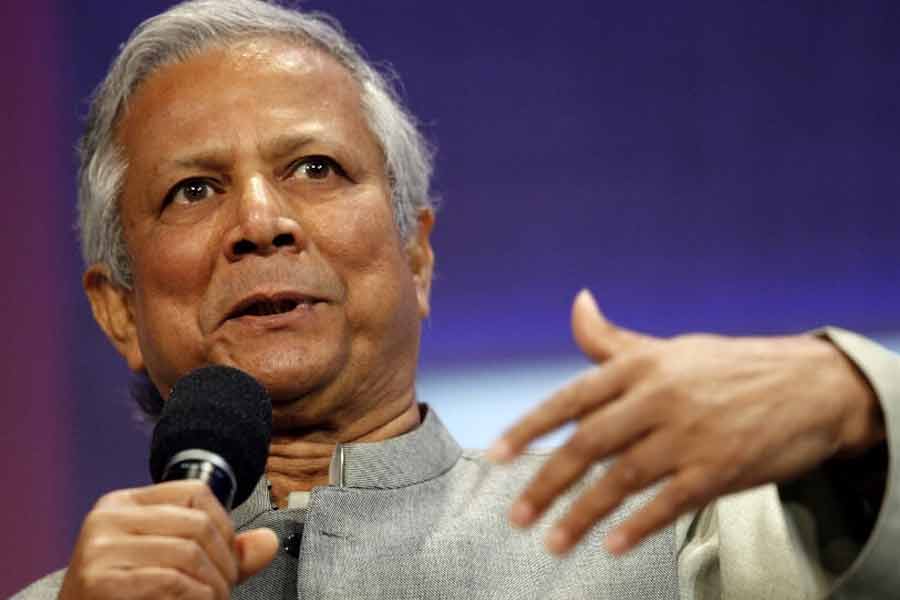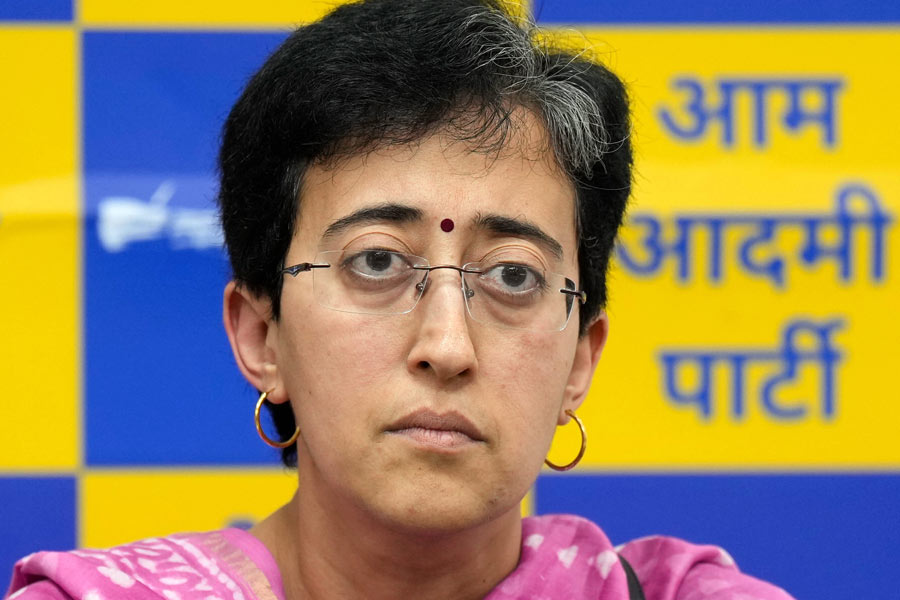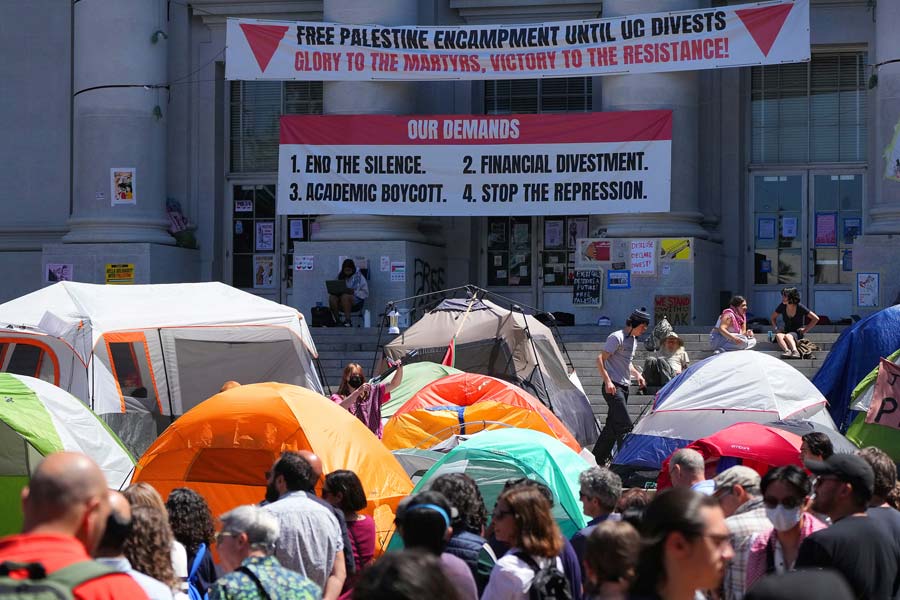Peace Nobel laureate and Grameen Telecom chairman Muhammad Yunus was sentenced to six months’ imprisonment in Bangladesh on Monday over alleged labour law violations.
Supporters of the micro-finance pioneer claimed he had been targeted because of his bitter relations with Prime Minister Sheikh Hasina.
Dhaka labour court judge Sheikh Merina Sultana announced the verdict against Yunus and three of his colleagues: Grameen Telecom director and former managing director Md Ashraful Hasan and board of directors members Nur Jahan Begum and Md Shahjahan.
The court, however, granted Yunus and the three others a month’s bail after they furnished bonds of 5,000 takas each.
The charges against Yunus, who had shown political aspirations in the past, and the others include failures to (a) distribute 5 per cent of the company’s net profit among workers as stipulated by Bangladeshi law, (b) regularise 101 staff members, and (c) compensate workers for public holidays.
“Three sections were invoked against my client to sentence him. All these are civil in nature and have civil remedies, but criminal proceedings were drawn against my client,” Abdullah Al Mamun, a lawyer for Yunus, told The Telegraph over the phone.
“This judgment is defective. We will file an appeal against the order in the labour appellate tribunal within 30 days.”
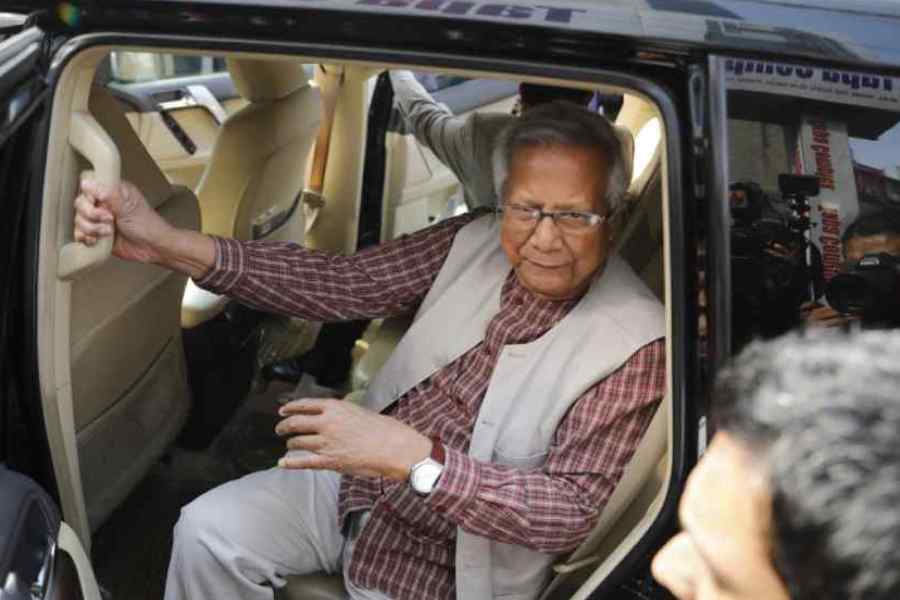
Nobel Peace Prize winner Muhammad Yunus arrives to appear before a labor court in Dhaka, Bangladesh, Monday, January 1 2024 PTI picture
Some aides to Yunus — recognised the world over for his efforts towards the social and economic uplift of the poor, especially women, through micro-credit and regarded as the founder of the Grameen Bank — complained that the Hasina government was hounding him to malign his image.
Those opposed to Yunus and his social business ventures, however, swatted away these allegations and said the labour law violations were just “the tip of the iceberg” of irregularities that Yunus and his team had committed over the years.
Amid this high-pitched debate — most Bangladeshi news channels hosted talk shows on the verdict on Monday evening — the sentencing of Yunus became a political issue.
The Bangladesh Nationalist Party, the main Opposition force that is not taking part in the January 7 general election and is organising movements to derail the polls, used the sentencing to attack the ruling Awami League.
“We condemn this judgment, which has been delivered following a directive from Ganabhaban (official residence of Hasina),” Ruhul Kabir Rizvi, senior joint general secretary, BNP, told reporters during a virtual news conference from an undisclosed location.
“This is nothing but part of the vindictive politics pursued by the Awami League regime. Dr Yunus is the pride of Bangladesh, but this government is hell-bent on harassing an international figure like him.”
The prosecution, however, said there was a solid case against Yunus and that the court had delivered the verdict based on the merit of its arguments.
“He (Yunus) has violated the labour laws of the country.... Earlier, the department of inspection for factories and establishments, which was probing the case following complaints from the workers, gave him two opportunities to rectify all the wrongs committed by the company. The matter reached the court because they did not undo the wrongs,” lead prosecutor Khurshid Alam Khan told this newspaper.
On the question of a jail sentence for a Nobel laureate, he said the judgment was against an individual, representing a company. “The law applies equally to all Bangladeshis,” he said.
Yunus had earlier been accused of tax evasion and settled the matter by paying a penalty.
The Nobel laureate is believed to have had a personal issue with Hasina — with whom he once shared a good rapport — since the Awami League government decided to remove him as head of the Grameen Bank in 2011 on charges of violating the country’s retirement age rules.
Although the world continued hailing him as the saviour of the poor and the marginalised in Bangladesh, Hasina often accused him of “sucking the blood” of the poor, referring to reports that the bank charged abnormally high interest and used strong-arm tactics to recover loans.
The bitterness reached new heights in August after 160 global figures, including former US President Barack Obama and former UN Secretary-General Ban Ki-moon, published a joint letter denouncing the “continuous judicial harassment” of Yunus. The signatories, including more than 100 of his fellow Nobel laureates, said they feared for “his safety and freedom”.
Multiple sources in the Hasina administration said that Yunus, who had always had political aspirations, had used his connections in the Western countries, especially the US, to boost his own image and defame Bangladesh.
Veteran journalist Nayeemul Islam Khan, who has tracked Yunus’s conflicts with government agencies for years, told this newspaper that there was a disconnect between Yunus’s image outside Bangladesh and what he did in the country.
“The friends of Yunus in the West are enlightened people.... If they conduct a review or research on the documented facts on what he has done against the interest of Grameen Bank employees and members, the injustice that he inflicted on thousands of people will become clear. Western societies don’t condone such acts and those convicted are sentenced to long jail terms,” Khan said.

